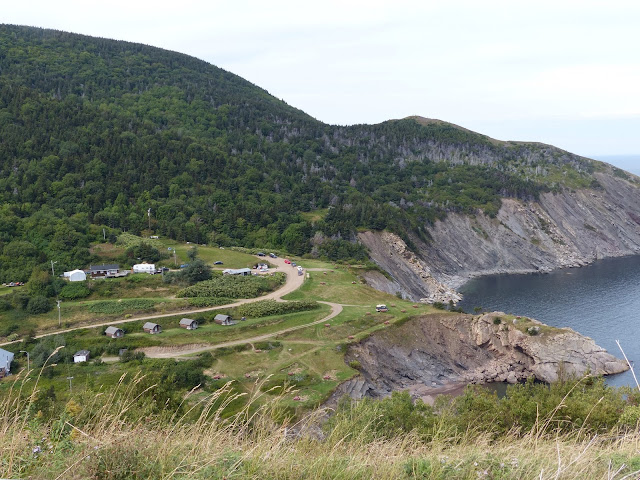 |
| Best campsite ever, although the small campground filled as the day went on. No matter. Absolutely gorgeous. |
We'd heard about Meat Cove long before we got to it. By many accounts, getting there seemed edgy; access is via a six-mile narrow, winding gravel road with sheer cliffs to the sea. Some reports said a 4WD was recommended. We gave ourselves permission to turn around if the potholes were too deep or if the road flirted too intimately with the cliffs.
No problem. The road was wide enough for two-way traffic and appeared to have been graded recently. Steeper sections had been paved. If anything, the glorious views improved with every turn as we descended to sea level and into the odd little settlement named Meat Cove. Apparently it's a year-round collection of about 65 people making a living from fishing and tourism.
 |
Meat Cove from the access road. Small cabins are available as well as 26 campsites along the bluff. All very simple.
No hook-ups. Suitable for Class B RVs and tents. Mostly tents.
|
 |
| Could be the best place I've done yoga ever. |
The McClellan family has lived and fished in Meat Cove for six generations, and proud of it. A young robust McClellan, who roared around on an ATV, showed us to a camping spot suitable for our van. PK handed him cash, but he returned a bit, saying, Don't worry about it, and waved us on. We think, that like most small business owners, he appreciated the cash to avoid the big dig credit card companies take with every transaction. Everybody was friendly and resourceful. We noticed him helping another camper level his van with select pieces from the Meat Cove Campground's wood pile.
 |
The beach can be reached from a short rail from the campground. The ocean was behaving more like a lake than a sea. Little pied plovers were working the shoreline. We learned about them here in New Brunswick, another of our favorite places on this trip.
|
 |
| PK relaxes against a slab of fallen cliff, scanning the horizon for boats, whales, seabirds, and seals. Ah, so peaceful. |
A surprise arrived in the evening, however. It was a BIG WIND. Had it been accompanied by pelting rain, it may have had a name. The windstorm probably packed about 50 mph sustained wind with higher gusts, but perched totally unprotected near the cliff as we were, it seemed mighty. We didn't get much sleep as the van rocked and rolled all night. I braced for the worst and wondered if the gusts were strong enough to tip us over.
Turns out I was being wimpy. Compared to the tent campers, we'd had it easy. When dawn arrived, many had already left. I bundled up and headed for the flush toilet (marginal), wind pushing at my back. En route a young woman wrestled with her pop-up tent, which had rolled and bounced down the road from her campsite. It refused to be corralled. She was laughing! No way could she get the tent up the road to her vehicle alone. Together we carried it, leaning into the gusts. She opened her hatchback and we stuffed it in, pretty much on top of her rottweiler-type dog, before she slammed the door shut and laid back against it.
Her dog was terrified all night, she said, still laughing. When sprinkles started, she let the dog into her tent, and her best friend walked all over her throughout the long night. Ha ha ha ha.
I loved her attitude - What else can I do but laugh? she said. I felt ridiculous that despite having spent the night in a comfortable, dry, cushy van without a dog walking on my face, I still managed to feel put upon by the universe. Forgive me.
 |
| Dramatic sunrise and roiling water. |
 |
| Angry sea punishing the beach we'd enjoyed the previous day. |
 |
| Sweet little water station for Meat Cove campers. |
 |
| Preview - on Cape Breton's Skyline Trail. |
Earlier posts about Road Trip 2016
Kouchibouguac National Park, New Brunswick, travel moment lasting an entire day
Kouchibouguac National Park, New Brunswick, travel moment lasting an entire day
Cemetery near RV park offers contrast, contemplation
Rain and a nasty encounter in wonderful old Quebec City
Meeting a time traveler on the roadRain and a nasty encounter in wonderful old Quebec City

























